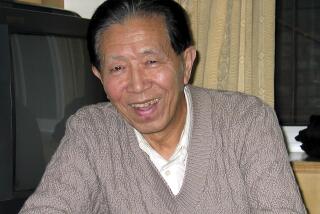Idealism Yields to Certification Exams : China’s ‘Barefoot Doctors’ Going the Way of Maoism
- Share via
PEKING — With little fanfare and apparently few regrets, China has abandoned the concept of using “barefoot doctors” to provide early and basic medical care to the nation’s 800 million peasants.
Last week, the Ministry of Public Health announced that the term barefoot doctor will no longer be used in the Chinese countryside, thus quietly scuttling an internationally known feature of rural life established under Mao Tse-tung in 1965.
The barefoot doctors were originally peasants given quick training in health care so that they could provide treatment in Chinese villages on a part-time basis while they continued to work in the fields.
Now, “barefoot doctors” seem headed for the same quiet end as Mao’s “people’s communes,” rural units set up in 1958 to control political and economic life in Chinese villages. Over the last three years, tens of thousands of communes have been phased out and replaced by ordinary, and less powerful, township governments.
In the case of the barefoot doctors, few or possibly none of the more than 1.2 million people now classified as such may actually lose their jobs.
Chinese officials said that those able to pass qualifying examinations will be called rural doctors, and that those who do not pass these tests will simply become health workers or medical aides.
In recent years, Chinese officials said, most of the barefoot doctors have been operating on a full-time basis and have not been doing farm work.
The end of the barefoot doctors is an example of how aspirations and ideology are changing in the Chinese countryside.
It was the dream of Mao and his supporters to set up an alternative health-care system, one quite different from the conventional Western model. The hope was that some peasants could be trained quickly and cheaply to provide basic medical care in their villages as a sideline, while continuing to work in the fields.
Mistrusted Professionals
The idea for the barefoot doctors grew out of Mao’s extreme mistrust of professionals and his fear that public-health officials were unable or unwilling to provide medical care in the countryside.
In a directive dated June 26, 1965, Mao wrote: “Tell the Ministry of Public Health that it only works for 15% of the total population of the country and that this 15% is mainly composed of gentlemen, while the broad masses of the peasants do not get any medical treatment. First, they don’t have any doctors; second, they don’t have any medicine.
“The Ministry of Public Health is not a Ministry of Public Health for the people, so why not change its name to the Ministry of Urban Health, the Ministry of Gentlemen’s Health, or even the Ministry of Urban Gentlemen’s Health?”
The idea for the barefoot doctors was also bred of necessity: In the mid-1960s, China’s rural areas were desperately poor and were suffering from a severe shortage of trained medical personnel.
Complaints at Service
Soon after the barefoot doctor program was set up, however, there began to be complaints that it provided a very low level of medical service. Chinese health officials have for years been trying to upgrade the training provided to barefoot doctors.
Last week’s announcement represents a personal victory for Deng Xiaoping, China’s present leader and a man who is as respectful of professionals as Mao was suspicious of them.
More than a decade ago, Deng engaged in a bitter war of words with the Maoists over the barefoot doctor program.
Deng said then that he hoped that the barefoot doctors would get better training. Speaking metaphorically, he told a visiting public health delegation that he hoped the barefoot doctors might soon wear “straw sandals” and then progress to “cloth shoes.”
In early 1976, as they were attempting to remove Deng from office, Mao’s wife Jiang Qing and her supporters in the “Gang of Four” used Deng’s comments about the barefoot doctors against him.
“The unrepentant capitalist roader (Deng) has even advocated that barefoot doctors ‘wear cloth shoes’ and ‘wear leather shoes,’ ” they wrote in the party magazine Red Flag. “This means wearing capitalist shoes and following the revisionist road.”
Not Nearly as Poor
Now, Deng is in power, Jiang Qing is in prison and China’s rural areas are not nearly as poor as they were when the barefoot doctor program was set up two decades ago.
Last week, Fei Xiaotong, China’s best-known sociologist, who carried out detailed studies of rural areas in the 1930s and the 1950s, told Western correspondents that he had recently toured the Chinese countryside again and had been astonished at the growing prosperity there.
“It’s unbelievable to me how quick the countryside is changing,” Fei said.
More to Read
Sign up for Essential California
The most important California stories and recommendations in your inbox every morning.
You may occasionally receive promotional content from the Los Angeles Times.













